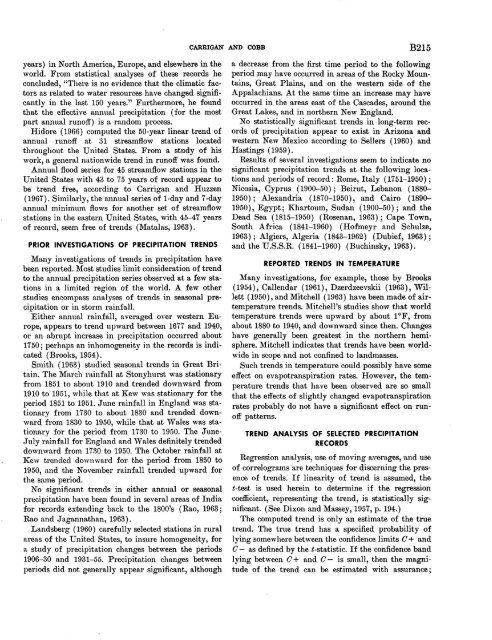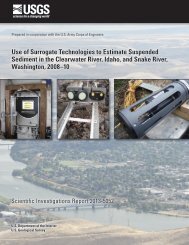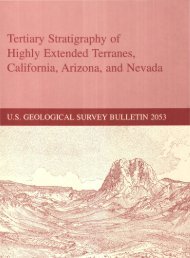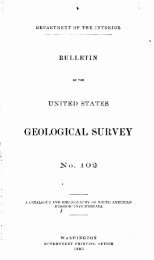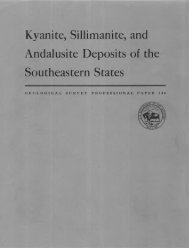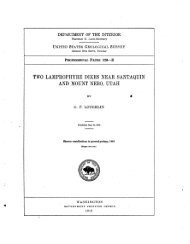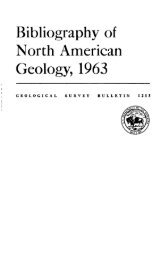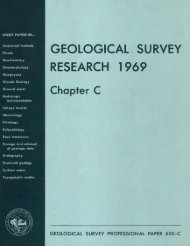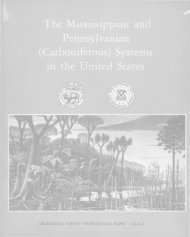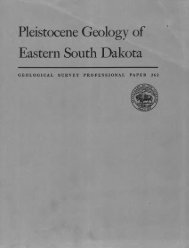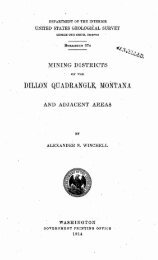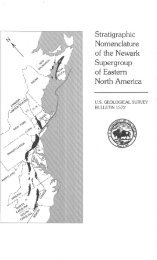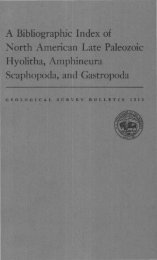RESEARCH· ·1970·
RESEARCH· ·1970·
RESEARCH· ·1970·
Create successful ePaper yourself
Turn your PDF publications into a flip-book with our unique Google optimized e-Paper software.
years) in North America, Europe, and elsewhere in the<br />
world. From statistical analyses of these records he<br />
concluded, "There is no evidence that the climatic factors<br />
as related to water resources have changed significantly<br />
in the last 150 years." Furthermore, he found<br />
that the effective annual precipitation (for the most<br />
part annual runoff) is a random process.<br />
I-Iidore (1966) computed the 50-year linear trend of<br />
annunl runoff at 31 streamflow stations located<br />
throughout the United States. From a study of his<br />
work, a general nationwide trend in runoff was found.<br />
Annual flood series for 45 streamflow stations in the<br />
United Stntes with 43 to 75 years of record appear to<br />
be trend free, according to Carrigan and Huzzen<br />
( 1967). Similarly, the annual series of 1-dny and 7 -day<br />
nnnual minimum flows for another set of streamflow<br />
stntions in the eastern United States, with 45-47 years<br />
of record, seem free of trends ( l\1atalas, 1963) .<br />
PRIOR INVESTIGA'TIO'N.S OF PRECIPITATION TRENDS<br />
l\1any investigations of trends in precipitation have<br />
been reported. l\1ost studies limit consideration of trend<br />
to the annual precipitation series observed at a few stations<br />
in a limited region of the world. A few other<br />
studies encompass analyses of trends in seasonal precipitation<br />
or in storm rainfall.<br />
Either annual rainfall, averaged over western Europe,<br />
nppenrs to trend upwnrd between 1677 nnd 1940,<br />
or nn nbrupt increase in precipitntion occurred about<br />
1750; perhnps nn inhomogeneity in the records is indicated<br />
(Brooks, 1954).<br />
Smith (1963) studied sensonal trends in Great Britain.<br />
The l\1arch rainfall at Stonyhurst was stationary<br />
frmn 1851 to about 1910 and trended downward from<br />
1910 to 1951, while that at l{ew was stationary for the<br />
period 1851 to 1951. June rainfall in England was stationary<br />
from 1730 to about 1830 and trended downward<br />
from 1830 to 1950, while that at Wales was stationary<br />
for the period from 1730 to 1950. The June<br />
,J uly rainfall for England and 'Vales definitely trended<br />
downward from 1730 to 1950. The Octob~r rainfall at<br />
l{ew trended downward for. the period from 1850 to<br />
1950, and the November rainfall trended upward for<br />
the same period.<br />
No significant trends in either annual or seasonal<br />
precipitation have been found in several areas of India<br />
for records extending back to the 1800's ( Rao, 1963 ;<br />
Rno and .Jngannathan, 1963).<br />
Landsberg ( 1960) carefully selected stations in rural<br />
areas of the United States, to insure homogeneity, for<br />
a study of precipitation changes between the periods<br />
1906-30 and 1931-55. Precipitation changes between<br />
periods did not generally appear significant, although<br />
CARRIGAN AND COBB<br />
B215<br />
a decrease from the first time period to the following<br />
period may have occurred in areas of the Rocky Mountains,<br />
Great Plains, and on the western side of the<br />
Appalachians. At the same time an increase may have<br />
occurred in the areas east of the Cascades, around the<br />
Great Lakes, and in northern New England.<br />
No statistically significant trends in long-term records<br />
of precipitation appear to exist in Arizona and<br />
western New l\1exico according to Sellers ( 1960) and<br />
Hastings ( 1959).<br />
Results of several investigations seem to indicate no<br />
significant precipitation trends at the following locations<br />
and periods of record: Rome, Italy (1751-1950);<br />
Nicosia, Cyprus ( 1900-50) ; Beirut, Lebanon ( 1880-<br />
1950) ; Alexandria ( 1870-1950), and Cairo ( 1890-<br />
1950), Egypt; Khartoum, Sudan ( 1900-50) ; and the<br />
Dead Sea (1815-1950} (Rosenan, 1963); Cape Town,<br />
South Africa (1841-1960) (Hofmeyr and Schulze,<br />
1963); Algiers, Algeria (1843-1962) (Dubie£, 1963);<br />
and the U.S.S.R. (1841-1960) (Buchinsky, 1963).<br />
REPORTED TRENDS rN TEMPERATURE<br />
Many investigations, for example, those by Brooks<br />
(1954}, Callendar (1961}, Dzerdzeevskii (1963), Willett<br />
(1950), and Mitchell (1963} have been made of airtemperature<br />
trends. l\1itchell's studies show that world<br />
temperature trends were upward by about 1 °F, from<br />
about 1880 to 1940, and downward since then. Changes<br />
have generally been greatest in the northern hemisphere.<br />
Mitchell indicates that trends have been worldwide<br />
in scope and not confined to landmasses.<br />
Such trends in temperature could possibly have some<br />
effect on evapotranspiration rates. However, the temperature<br />
trends that have been observed are so small<br />
that the effects of slightly changed evapotranspiration<br />
rates probably do not have a significant effect on runoff<br />
patterns.<br />
TREND ANALYSIS OF SELECTED PRECIPITATION<br />
RE'CORDS<br />
Regression ruralysis, use of moving averages, 'aJld use<br />
of correlograms are techniques fur discerning the presence<br />
of trends. If linearity of trend is assumed, the<br />
t-test is used herein to determine if the regression<br />
coefficient, representing the trend, is statistically significant.<br />
(See Dixon and M·assey, 1957, p. 194.)<br />
The computed trend is only an estimate of the true<br />
trend. The true trend has a specified probability of<br />
lying somewhere between the confidence limits 0+ and<br />
0- as defined by the t-statistic. If the confidence band<br />
lying between 0 + and 0- is small, then the magnitude<br />
of the trend can be estimated with assurance ;


